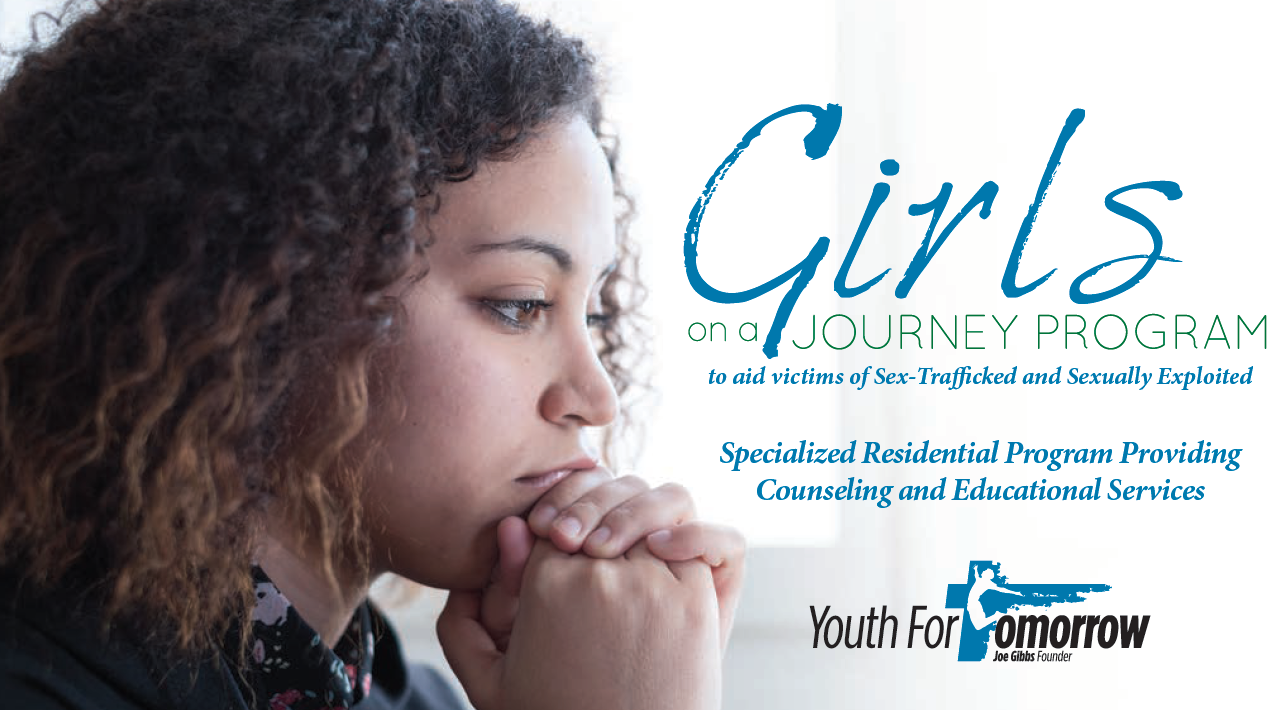Girls on a Journey
To aid victims of Sex-Trafficked and Sexually Exploited

More than 100,000 American children are at risk for commercial sexual exploitation each year.
U.S. Department of State, November 2009
The Federal Bureau of Investigation (FBI) has identified the Washington, DC area as one of the 14 major sex trafficking centers in the U.S. YFT is the only facility in Virginia and in the mid-Atlantic region that works to offer safe and secure residential and specialized recovery service for girls ages 13 to 19 who have been sexually exploited/sex trafficked. YFT professionals help girls who are victims of sexual abuse and trafficking to regain their lives through individual service plans that set weekly priorities and goals for each girl in their education, residence, counseling/therapy, supervision and safety, self-reliance and relationships.
- According to the U.S. Department of Justice, human trafficking has become the second fastest growing criminal industry — just behind drug trafficking — with children accounting for roughly half of all victims.
- The FBI has identified the Washington, DC area as one of the 14 major sex trafficking centers in the U.S.
- 100,000 American children are exploited through the commercial sex industry each year.
- The average age of entry into CSEC is 12 to 14 years old.
- Human Trafficking is a $150 billion dollar industry worldwide
The Girls on a Journey program (GOAJ) offers trauma specific treatment to survivors of commercial sexual exploitation. Since its inception in 2008 the GOAJ program has served hundreds of girls. Survivors of CSEC have experienced complex emotional, physical, and sexual trauma requiring specific treatment interventions. Survivors of CSEC experience emotional, behavioral, and mental health symptoms that often go unidentified or misdiagnosed. Without proper support and treatment the risk for being re-victimized is high. Through the Girls on a Journey Program survivors receive treatment and support to address safety needs, gain understanding of the victimization they have experienced, improve self-esteem, develop motivation for change, improve life skills, and empower them to reach future goals. Program components include:
- Assessment and diagnosis
- Administration of the TSCC, APS, SASSI, and CSSRS
- Trauma-specific therapy for survivors and their families
- Therapeutic behavior management program
- Psycho-educational groups, such as anger management, social skills, stress management, communication skills and daily living skills
- Weekly priorities and goals review through individual treatment plan
- Independent living and job skills training
- Substance abuse education
- Substance abuse treatment (Matrix Model)
- Medical treatment
- Protection in partnership with police and FBI
- Community based support and partnerships with the private sector to provide valuable workforce development skills to the girls
- Animal assisted therapy
- Equine therapy
- Music and arts therapy
-
Fully accredited school (grades 7-12, GED)
- Adapted schedules if needed to support mental health needs
- Trauma informed teachers and staff
- Supportive interventions within the classroom (use of grounding objects, breaks, art, journaling, exercise, animal assisted therapy, or other coping strategies to assist in emotional regulation during the school day)
- Individualized educational goals
- Tutoring
- Credit recovery

